Rafah, Gaza Strip 30 June 2003
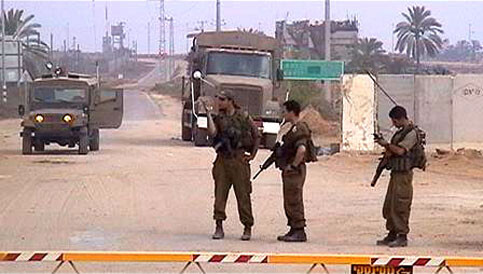
Israeli soldiers at the Abu Holy checkpoint.
We danced past Al-Matahin checkpoint today, waved to the soldiers hidden in the military towers guarding the bridge as we skipped past the warning sign in three languages, “Forbidden to stop under this bridge,” and then the bridge itself, and ran past Abu Holy checkpoint to join the crowd of journalists, travelers, and curious people who had gathered to watch the Israeli army do what no one had dared imagine possible. In the early morning heat, we squinted through our exhaustion at the strange young well-armed men overdressed in green flapjackets and sunglasses as they began, in a mostly timely manner, to dismantle Abu Holy checkpoint.
And we ran through the checkpoints, from one military sniper tower to the other, where they had begun to remove the roadblock that divides the settler road from the Palestinian road on Salah el-Deen Street. We ran past the meter-cubed concrete roadblocks, past the crane, past the journalists and the crowd and the cars, until we found a table with an old woman selling cola and snacks. We filled our dried-out, sun-tired bodies with warm cola, and she let us pour her washing water over our hair, and it was a perfect day again. We ran back, climbing with the other journalists on the roadblocks that remain, trying to get a better view. It was the biggest party in the Gaza Strip since the beginning of this Intifada.
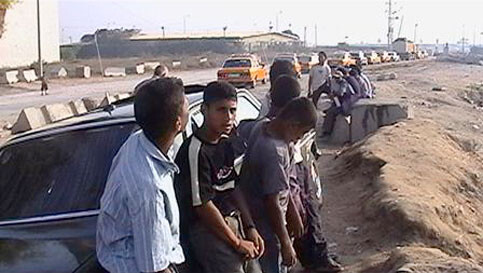
Palestinian wait by the Abu Holy checkpoint to see if the rumours are true. Today, at least, the wait will not be in vain.
We were among the first people to walk freely through this set of checkpoints in years. Since October 9, 2001, anyone on the occupied side of the street must pass it in a car carrying at least three people, a measure taken to protect against suicide bombings but ostensibly useless as factions have sacrificed seven people and two dummies in attacks here since its implementation.
Kicking on adrenaline and two hours of sleep, we had left Rafah at 6:30 AM to the sound of morning gunfire at Salah al-Deen gate, Rafah’s wakeup call from the Israeli military. On the way, we called ahead to the Palestinian checkpoint office to see if our sources were solid, were they really going to dismantle Abu Holy? “You are dreaming, go back to bed,” and a dial tone to confirm. But we were on our way already and nobody believed us, not least of all our own selves, puffy-eyed and half-dreaming, in the 8-passenger cab with everybody confused and disbelieving, but we were on our way. If Abu Holy was gonna be taken down, we were going to be there, and we were gonna buy the T-shirt, too.
We arrived to a glint of hope, a few journalists in addition to the normal crowd of children selling peanuts, wafers, cigarrettes, tea and coffee. Boys twelve-years-old smoking stale cigarettes when nobody is buying. Boys seven-years-old who will ride with you through the checkpoints for a sheckel if you’re not enough people in the car to pass. Where will these kids go for pocket change when Salah el-Deen Street is free?
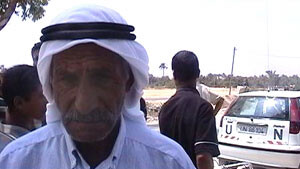
Abu Holy, the man after whom the checkpoint is named by Palestinians. Abu Holy gained the dubious honour when he lost 450 dunums of farmland and his house to accommodate its construction.

Palestinian Authority security jeeps begin to pull in at the scene, and officers march down the road in green and blue uniforms.
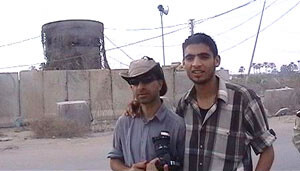
“Wish you weren’t here.” Posing in front of a fortified Israeli position.
My 23-year-old colleague is in awe, this is the first time in his life he has seen Israeli soldiers outside of their tanks, their bulldozers, their sniper towers. He is shocked to see that in reality many of them really are 18-year-old boys, exactly like everybody said but impossible to imagine from this side of the tank’s bulletproof glass. They are looking scrawny and miserable under the hot sun, wrapped in heavy uniforms and ammunition. He calculates how much their guns must weigh and factors in their lack of sleep. “These soldiers, they are really unhappy,” he declares. And they stare back at us; some adjust their uniforms for our photos, “They must think you’re a settler,” he concludes. And I wonder, and I wonder, do they know who I am? I hear a soldier passing me by murmer to another next to him, “ha’yehudiah (the Jewish girl).”
I sit on a road block not a meter away from some of them — it has been two months since I have seen an Israeli soldier walking around, and the gap is wider than it once was. The culture shock is deeper than it once was. I wish I had words to ask one of them, what exactly is it you are feeling now, exactly what are you here for, but between language and language something slips, and instead I just sit on the roadblock, gawking and feeling younger than I am and utterly unprepared for these circumstances.
And in the end they don’t take down the military towers this day like they said they would, although most of the roadblocks at Abu Holy are now gone and the settlement road and the Palestinian road have been reunited as one. And the military base that guards the settlement remains, and they’ve begun to add some construction to it. And in the end they take away the military towers closing off Moraj Road but they demolish the road, rendering it useless. And in the same day they install a new military tower along the Occupation Wall in the Yibneh area of Rafah in the space of hours. And in the end they pull out of Beit Hanoun and Beit Lahia, and everyone rejoices, but still there are two cities newly traumatized from a month of invasion. Each small step towards peace holds like thin crystal in the most callussed of hands. The intentions of the negotiating parties who talk as children, who will blow bubbles in the summer just to watch them dissintegrate in the air. Peace as fragile as a house of cards, everybody holding their breath trying hard not to hope.
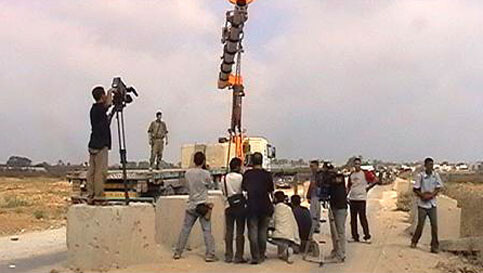
Some of the Abu Holy checkpoint structures are dismantled.
So it is a bittersweet affirmation in the hot day. People celebrating their opportunity to practice a severely limited version of their basic human rights. Celebration only within the framework of this three-year wake. A people so beat down that the smallest ease feels like the weight of the world being lifted, if only for a day. We all know they can put the Abu Holy roadblock back up in the same several hours it took to take it down. But around these parts there’s not often cause for celebration. We cry every day here and we have forgotten how to dream. But today, for the first time in three years, people walked down a certain stretch of land they had been denied for ages, and it made our tired bones stronger than they were.
Laura Gordon is a 20-year-old American Jew who came to Israel in December 2002 with the Birthright Israel program and proceeded, three months later, to begin work with the International Solidarity Movement in Rafah. She moved to Rafah two days after Rachel Corrie was killed and has been there since. She works primarily in media work and documentation; and also to liase between the Rafah community and the international community through summer camp projects, cooperative building projects, and English teaching.


